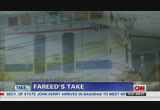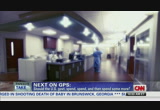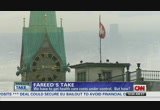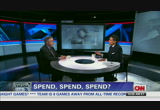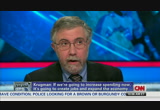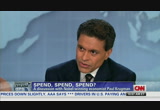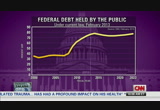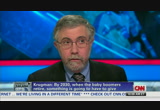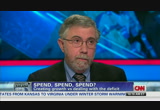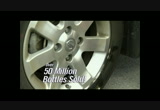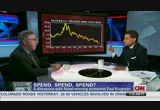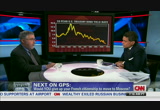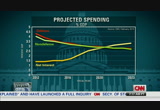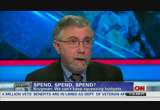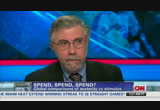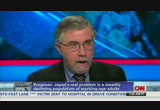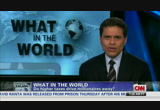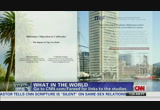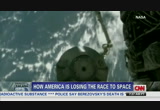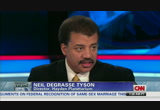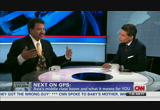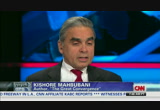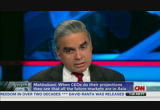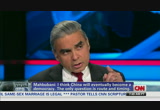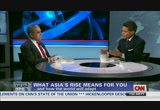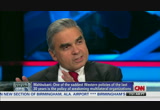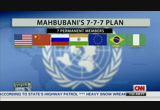tv Fareed Zakaria GPS CNN March 24, 2013 7:00am-8:00am PDT
7:00 am
common sense gun laws. you can be both. that's what we need right now. i, as a career prosecutor, have personally seen cases of police officers and innocent babies being killed by assault weapons. there is no reasonable basis for having those in our streets. i applaud senator klein. >> seeing the same sorts of urgeance we see in places like maryland and moving forward on gun control. the legislative politics on this are very different. the structure of the senate, two senators per state magnifying the influence of small, rural space and that makes gun control very difficult to get to 60 votes. all these ideas that you mention certainly background checks are national majority propositions in polling. it is a very different politics at the presidential level, not cost free for republicans to block all this in terms of how it positions the party for 2014, especially in some of these swing states. >> the democrats in red states. >> that's the thing, in red states it's a problem
7:01 am
congressionally. at the national level, there is a presidential level majority for this in 2016. >> i've got less, less than a minute. i need to get your take on immigration reform. it seems to me it stepped backwards from it's inevitable to we almost got it to guest visas and on what happens to health care for undocumented workers who become documented. >> look, it's really hard, but i bet in the end they get 60 votes. the key question whether john boehner will bring a bill to the house. >> i am confident that john boehner will bring that bill and i'm feeling optimistic we have come too far right now with labor and business arguing about defense and we just can't have a 95% agreement get sabotaged over that. and 13 years is too long. the path for citizenship cannot take 13 years. it is not right for those people who have been living in this country and working hard and
7:02 am
playing by the rules. >> that's a discussion we could have in the comfort of a cnn studio when we're all senators. >> kamala harris, ron brownstein, ana navarro, thank you. head for our popular online segment called getting to know. this week you'll get to know more about california ag kamala harris. fareed zakaria "gps" is next. this is "gps global public square." welcome to all of you in the united states and around the world. i'm fareed zakaria. a great show for you today. first up, the question for the economy. should we save or should we spend? what will get the economy moving faster? i'll talk to the chief proponent of spending. nobel prize winning economist
7:03 am
paul krugman. then, the race for space. is america losing? china is building its own space station and the u.s. has to rely on russia to send our astronauts up to the stars. what is going on? and the exploding middle class. in more than seven years it will triple in size to almost 2 billion people. it will change the world. we'll talk about how. but, first, here's my take. those of you who follow the show reg lerly know i have long argued that cutting government spending in the midst of a weak recovery is not a path towards growth. but i have also argued that america does have a debt and deficit problem and we need to take it very seriously. the fact is, the vast majority of our debt problems relate to the costs of health care in america. now that the debate over obama care is over, we should start thinking about how to get america's health care costs under control. as it turns out, two new works,
7:04 am
a book and a magazine cover story provide some very useful ways to think about it. the central debate between democrats and republicans is over whether the free market works well in health care. in a new book, catastrophic care, david goldhill makes the case for the market arguing that people need to become consumers of health care so that they, not insurance companies, not the government, actually see, feel and pay the bills. that will force producers of health care, doctors and hospitals, to push down prices and drive up quality. that's what happens with groceries and television sets and computers. lasiks surgery which is not covered by health insurance, has seen a 90% drop in price and increase in quality since it was introduced in the 1990s. that's what happens when consumers pay for a product. makes an opposite case in a recent cover story in "time" magazine. he pain stakingly went through the actual bills that hospitals
7:05 am
put out and found that they charge massively for routine procedures and medicine. he found, for example, a routine blood test was billed to patients at a hospital at the rate of 199.50. medicare pays for that same test, $13.94. america's health care industry is not a real market, but for different reasons than many on the right. he says that there is so many monopolies and so much disinformation that it cannot function as one. most important, he says, is that the consumer, when buying health care, simply does not have the power to act as he or she does in other markets. when a doctor tells you need a ct scan, you are unlikely to say, no, thanks. or to start haggling over the price. i think you should read the book
7:06 am
and essay and how to reform what everyone thinks is a badly functioni functioning, almost crooked health care. this is not an argument for the poor to fend for themselves. my own views on this difficult issue are open. i want to read more and understand better what seems to be working and cutting costs and improving quality across the country and the world. but i do think that steven points to a very real problem in health care as a market and that these are inherent in the nature of health care. the consumer does not have the knowledge or the power to act as he or she does in other markets. perhaps that's why in every other rich country in the world, we have found that markets don't function properly in health care and that includes very free market nations like singapore and switzerland, both of which score higher than the united states on the heritage foundation index for economic freedom. yet all of them provide
7:07 am
universal health care at much, much lower costs than we do with much better health care outcomes than we have. let's get started. should the american government just spend, spend, spend and then spend some more and not worry about the deficit? paul krugman the principal intellectual proponent of the idea deficits don't matter, at least not now. i thought we'd spend some time understanding the thinking behind the theory. krugman is the nobel prize winning columnist for "new york times." he won it for economics, not the op-eds and also a princeton professor. thanks for doing this, paul. >> hi, there. >> so, explain, you know, first, very succinctly why you feel that right now, really a, there is almost as far as i can tell, almost no limit to what you'd be willing to do in terms of stimulating the economy.
7:08 am
>> okay, yeah. right now is a time when not spending is extremely disruptive. the government pulls back, it's destroying jobs and there's no way to off set that. ordinarily if the government spends less than the federal reserve can offset that by cutting interest rates, we did at the end of the cold war when we cut military spending but the fed cut rates and nothing terrible happened. we can't do that now because the interest rates of the fed control are at zero. no offset and conversely up to, if we can increase spending right now, it will create jobs and expand the economy and this is a really good time to be spending. won't always be like this. this is not the normal situation. normally we have an economy that is more or less operating at full capacity and the fed is raising interest rates to offset the risk of inflation, in which case, you know, we have a lot of, we can off set any changes in spending. we'll have to, an increase in spending in a normal time like 2000 or 2007, the fed will raise
7:09 am
interest rates and it will not be helpful. this is not that kind of time. and we have, basically, a depressed economy is a time when there really are, the private sector wants to save more than the private sector is willing to invest. we're basically a wash in desired savings with no place to go. so, having the government borrow some of those pent up, useless savings and put them to work is good for everybody. >> what do you say to people who say, yes, but this traditional mechanism just doesn't seem to be working because if you look at the amount the government has spent. i qknow you think the stimulus isn't large enough. but it was fairly large by historical standard we went from debt to gdp from 40% to 70%, 80%. we are in the weakest recovery since the great depression. is that proof that this kind of, this kind of stimulus just
7:10 am
doesn't work in today's economy? >> no, because it's exactly what you would have expected to happen. this was one hell of a financial crisis. worse than the great depression, exactly. we had a huge fall in private investment, collapse of the housing bubble, coupled with a huge rise in public savings and households trying to pay down debt. of course, you have to run large budget deficits just to stay in place. you don't expect the numbers we have been seeing to be enough to produce full employment. >> when people look at this issue, there are people who you often call deficit and some of the things they point out. let's look at this first chart. you have a long-term problem here and even if you, you know, you get, you can stabilize debt, what is going to happen because of, essentially, the aging of the population and health care cost, is our debt to gdp ratio sort of stays very, very high and the 70 to 80% of gdp and could even go higher than that. >> could go higher. but two different questions.
7:11 am
one is, what does the near term, even the next ten years look like? the next ten years are not scary. debt ratio will rise better. we would like to have less debt, but no crisis. the markets don't think there is a crisis. >> because we can borrow money cheaply. >> that's right. >> go back up to the year 2030, something is going to have to give. 2030, all baby boomers will have retired and social security will be expensive and medicare will be expensive and health care costs continue to rise, which they probably will or hopefully will bring them somewhat under control. something will have to give, we'll have to find spending cuts or adisditional revenues. why exactly do we have to solve that problem now? what does that have to do with our spending in the year 2013? no one has given me a good answer to that question. >> it is two-fold. if you make cuts in entitlement programs, you need to give people time to plan for it. if you're telling somebody who is 45 years old, look, when you
7:12 am
get to be 65, here is the world will look different and your benefits will look different. he or she has 20 years to plan for it. secondly, also many of these changes, these reforms are somewhat complex, particularly in health care and you want to try them out and figure out whether they would. for both those reasons, you don't want to tell somebody who is 64, oh, by the way, next year your benefits will be down 30%. >> i think that's a very much weaker argument. usually you hear people say, well, you know, we're running up debt and we can't afford this stuff. that's not the issue. now, you are saying there are administrative and planning issues that means if you have lower benefits in the year 2030, we should probably let people know about that some ways in advance. particularly since health care costs is the biggest issue, by all means, we should be trying pilot programs and controlling health care costs. guess what, we're doing that because a lot of the stuff in the affordable care act. i think it's really important to understand that there is a lot
7:13 am
of ilogic going on here. if we don't do something, we will have to cut benefits in the future and in order to avoid that, we have to commit our selves to future benefit cuts. that doesn't make any sense at all. we're down to now, really, the things are second order compared to the issue of fighting unemployment right now. we'll be back in a moment, more with paul krugman, interest rates today at record lows. they have no lower to go. does that mean at some point they have to go up? and what happens to the deficit and to paul krugman's theories then? i'll ask him.
7:14 am
♪ ♪ the new blackberry z10 with blackberry hub and flick typing. built to keep you moving. see it in action at blackberry.com/z10 today is gonna be an important day for us. you ready? we wanna be our brother's keeper. what's number two we wanna do? bring it up to 90 decatherms. how bout ya, joe? let's go ahead and bring it online. attention on site, attention on site. now starting unit nine. some of the world's cleanest gas turbines are now powering some of america's biggest cities.
7:15 am
siemens. answers. governor of getting it done. you know how to dance... with a deadline. and you...rent from national. because only national lets you choose any car in the aisle... and go. you can even take a full-size or above, and still pay the mid-size price. this is awesome. [ male announcer ] yes, it is, business pro. yes, it is. go national. go like a pro. ♪ if loving you is wrong ♪ i don't wanna be right [ record scratch ] what?! it's not bad for you. it just tastes that way. [ female announcer ] honey nut cheerios cereal -- heart-healthy, whole grain oats. you can't go wrong loving it. bee happy. bee healthy. with clusters of flakes and o's. oh, ho ho... it's the honey sweetness.
7:17 am
...and we inspected his brakes for free. -free is good. -free is very good. [ male announcer ] now get 50% off brake pads and shoes at meineke. and we are back with nobel prize winning economist, paul krugman, columnist for "new york times" and digging into the theory that the federal deficit does not matter in the short term. what matters right now is spending. the u.s. government should spend to spur growth. let's look at the other issue people raise, which is interest rates. >> yes. >> a lot of these projections when they go forward are assuming interest rates will stay very low. and if you look at the ten-year treasury yield over the 1990s average 6%. over the last seven or eight years, it's averaged 4%. it's currently about less than
7:18 am
2%, as you know. so, the possibility of interest rates staying as low as they are now is highly, highly unlikely and that as interest rates rise, yes, the economy will recover, but the interest payments on this much, much larger debt become crushing. >> couple things here. first of all, as long as the economy economy remains weak, also the economy gets stronger, we'll have more revenue and, also, if the economy gets stronger, then i start to become a hawk if the economy is strong enough. by no means am i saying, we have to stay in this mode under all conditions. under these questiconditions yo to do that. the idea that necessarily we're going to be facing higher interest rates some time soon is by history. look at japan. japan has been running large deficits, as much as twice the debt burden that we have.
7:19 am
still very low interest rates. just not a story that you should place a lot of weight on and, by the way, the projections right now about what the interest burden on the federal budget will be in the year 2023, they say that it will be as high as it was in 1991, 1992. we actually had interest payments that were over 3% of gdp under bush one and then they came way down. people said, oh, look at these scary numbers about rising interest payments, they, the scenario we're supposed to be afraid of is the things we go back to the way they were 20 years ago, which doesn't seem all that scary. >> let's look at that. we have a chart with precisely that. you see three lines. this is the net interest payments and this is a fairly modest, modest rate increases. and what you see here is nonentitlement spending. you see how they get, they come down. what i want to ask you, as a
7:20 am
liberal, don't you worry that if entitlements continue to go up and nothing is done about it, what is going to happen is, forget about defense, but look at nondefense discretionary spending. this is education. this is, all the kinds of programs that you're passionate about that are naturally and necessarily almost going to get squeezed as entitlement spending becomes larger and larger. >> they're going to get squeezed, again, if we look beyond, if we look past and we look to the year 2025, 2030, something has to give. we can't keep squeezing nondefense. nondefense discretionary, that's already pretty tight. and something will have to give. some combination of higher revenues find ways to save money on entitlements, but certainly ways to save money on entitlements. use the bargain power of medicare and all these things, fine. all of which is stuff that is
7:21 am
worth talking about, but not a reason to not do deficit spending to support the economy now. >> the argument a would be, and this is the argument made by many do defense spending now and also put in term a long-term plan so that, "a" you assure the markets that you to have a plan. you're not hostage to fortune and case interest rates spike suddenly. you have a process in place that allows it to happen and you don't get hemorrhaging of nondefense discretionary. why is that wrong? >> no, i would like to see men and women of good will in washington come together and produce a long-term budget solution along with doing the stimulus that we need for the economy right now. i would also like to see world peace and universal marriage fidelity. trouble is, it's not going to happen in the current political environment. we're having a situation in which, as the debate over the sequester unfolded, you had
7:22 am
republicans saying, this is terrible. it's going to open us up and it's serving iranians, but not a penny of tax increases. no way. in that political environment, it's an unrealistic thing to expect any kind of grand bargain and we don't want to hold short-term economic policies hostage to having this grand bargain that i'd love to see but isn't going to happen right now. >> let me ask you about the last graphic about japan. japan looms large and you spend a lot of time working on it. you came to my attention first when you wrote a book about the, you know, japan-style depression economics and the age of diminished expectations. >> no, japan was the full-scale dress rehearsal for what we're going through now. japan is, people who were studying japan in the 1990s are the ones who are dreading what actually happens. >> when you look at japan. one thing you say, you're glad that the fed, the japanese central bankers finally doing something, but you often argue
7:23 am
that japan didn't do enough in terms of stimulus. i want to show you japan's debt to gdp. and, you know, if this isn't enough, then what is? look at what japan spent over the last 20 years. every road, every highway that you could find and it went from, you know, 60% debt to gdp to 250% and, still, it didn't get out -- >> we need to be a little bit careful here because that is gross debt and the japanese -- >> it's still under 40 something. it's still very large. >> from about 30. >> and the answer, two-part answer. one is that the japanese dribbled the stuff out. there was never a big push. what japan needed to do was get out of deflation and to do that they had to have strong fiscal stimulus by monetary policy which is possibly what they're about to do now, but it will be the first time. the other thing is that i think japanese situation is inherently
7:24 am
more difficult than ours. because of a shortage of japanese. very low fertility rates, cultural aversion to immigration. if you actually look at japanese growth per working needs adult, it's not bad. it had long periods of slump, but over the past 20 years, they have actually done about as well we have. the problem is they have actually steadily declining of adults. >> if we went up on this scale, we would stimulate the economy and get it to a permanently higher level than japan? >> yes, no certainty in life. but everything i can see in the numbers, everything i can see in the historical experience says if the united states had a period of strong fiscal stimulus, accommodative monetary policy that we could get back to sustain prosperity and you can see, you can see a virtual circle building in the u.s. economy right now. you can see the housing is
7:25 am
starting to recover and the main thing holding housing back is that young people aren't moving out and starting families because they can't find jobs. they are staying with their parents. if we get improving jobs, we get improving housing, which means more jobs. all of which will kick into place unless we screw it up by fiscal austerity. >> paul krugman, pleasure, as always. >> thank you. up next, the quintessential french actor may soon no longer be french. what in the world is up next. when news breaks, you have to be prepared,
7:26 am
7:27 am
plays a key role throughout our lives. one a day women's 50+ is a complete multivitamin designed for women's health concerns as we age. it has 7 antioxidants to support cell health. one a day 50+. waiting for your wrinkle cream to work? neutrogena® rapid wrinkle repair has the fastest retinol formula. to visibly reduce fine lines and wrinkles in just one week. neutrogena®. let's see what you got. rv -- covered. why would you pay for a hotel? i never do. motorcycles -- check. atv. i ride those. do you? no. boat. house. hello, dear. hello. hello. oh! check it -- [ loud r&b on car radio ] i'm going on break! the more you bundle, the more you save. now, that's progressive.
7:29 am
now, for our what in the world segment. not every day you see russia's vladimir putin receiving a bear hug from a frenchman. the actor is no ordinary frenchman. in fact, he may not even remain french for very long, in some sense. you see he has been threatening to give up his french passport, especially now that putin has handed him a brand-new russian one. but why on earth would he or anyone for that matter want to leave france? think of the food, wine, paris, countryside. it comes down to taxes. under the president, france has
7:30 am
been weighing the proposal for a 75% marginal tax rate on million airs. russia on the other hand, off aersa a flat 13% tax. it's not a foreign concept, here in america a number of high earners move between states to save on taxes. the golfer phil mickelson recently threatened to leave california after the golden state raised its top income tax by 3 percentage points. tiger woods already did that years ago moving to florida. in fact, many american retirees move to florida or texas, neither of which get much snow, but perhaps even more enticing, neither collect state income taxes or estate taxes. so, is it counterproductive to raise taxes on millionaires? does it drive high earners away? a number of new studies actually address the question. two economists, christopher young of stanford recently
7:31 am
examined the case of new jersey, which raised its top tax rate in 2004. anyone who was making more than $500,000 was subjected to an extra 2.6% in taxes. so, what happened? well, as you would expect, there was an increase in the number of millionaire as who left the garden state. in 2006, that loss ended up costing new jersey $16.4 million in foregone levees. get this, the overall gains from higher taxes on the rich came in at 65 times that number, more than $1 billion. why? well, in part, the sheer number of millionaires increased and the vast majority of high earners did not leave. many had jobs or businesses that were tied to the state. other studies on california and maryland show similar findings. we've linked them all on cnn.com/fareed. let me be clear, i am not recommending higher taxes on
7:32 am
rich people, but it's important to examine the facts. we tend to think california or new jersey made a mistake simply because high-profile celebrities threaten to leave the state. but the facts show that this is more complex. you can question the policy, but not the numbers. taxing the rich, so fart a least, has clearly generated more money than produced losses. this is true up to a point, of course. what about taxes around the world. do people move from high tax to low-tax areas? the data is more difficult to gleam there. i couldn't help but wonder as i watched him show off his new passport in the russian republic, he would need to spend six months of the year in russia to qualify for its 13% tax rate. to do that, he would have to deal with russia's frigid winters and deal with a culture that is not always friendly to foreigners trade french food for russian food and, most importantly, he'd have to give up what is surely one of life's
7:33 am
greatest treasures, living in paris. i don't think i'd make the trade. we'll be right back. up next is america being left behind by the rest of the world in the space race? neil neil degrasse tyson explains. come on, nowadays lots of people go by themselves. no they don't. hey son. have fun tonight. ♪ ♪ back against the wall ♪ ain't nothin to me ♪ ain't nothin to me [ crowd murmurs ] hey!
7:34 am
♪ [ howls ] ♪ even in stupid loud places. to prove it, we set up our call center right here... [ chirp ] all good? [ chirp ] getty up. call me! seriously, this is really happening! [ cellphone rings ] hello? it's a giant helicopter ma'am. [ male announcer ] get it done [ chirp ] with the ultra-rugged kyocera torque, only from sprint direct connect. buy one get four free for your business. only from sprint direct connect. all stations come over to mithis is for real this time. step seven point two one two. verify and lock. command is locked. five seconds. three, two, one. standing by for capture.
7:35 am
the most innovative software on the planet... dragon is captured. is connecting today's leading companies to places beyond it. siemens. answers. could lose tens of thousands of dollars on their 401(k) to hidden fees. thankfully e-trade has low cost investments and no hidden fees. but, you know, if you're still bent on blowing this fat stack of cash, there's a couple of ways you could do it. ♪ ♪ or just go to e-trade and save it. boom. ♪ or just go to e-trade and save it. boom. at od, whatever business you're in, that's the business we're in. with premium service like one of the best on-time delivery records and a low claims ratio,
7:36 am
we do whatever it takes to make your business our business. od. helping the world keep promises. [ male announcer ] when you wear dentures you may not know it, but your mouth is under attack. food particles infiltrate and bacteria proliferate. ♪ protect your mouth, with fixodent. the adhesive helps create a food seal defense for a clean mouth and kills bacteria for fresh breath. ♪ fixodent, and forget it.
7:37 am
i'm candy crowley in washington with a check of the headlines. the israeli military said its troops came under fire today from the syrian side. israeli soldiers fired back. israel blames the syrian military for the incident, but syria's opposition network says rebels were clashing with the syrian army near the border at the time. u.s. secretary of state john kerry made an announced visit to baghdad today to meet with iraq's leadership including mali maliki. the iranian overflight carrying armed fighters to syria are "problematic." after more than four years of self-exile, pakistan's former president musharraf returned home sunday where he faces criminal charges by the state and an assassination threat by the taliban. musharraf resigned in 2008 and went into exile in london and dubai. he declared his intention to run
7:38 am
for office. it may say spring on the calend calendar, but someone must have forgotten to tell mother nature. parts of eight states under winter warm warnings. whiteout conditions in colorado prompted authorities to close more than 150 miles of interstate 70 yesterday. those are your top stories. now, back to fareed zakaria "gps." around the world, countries are pouring money into space. russia, china and india are all advancing their space programs, but here in the united states, the opposite is happening. there are no plans to launch astronauts from american soil in american crafts for a decade. why? and what are the larger implications. i'm joined now by a man who knows and cares deeply about this issue. neil degrasse tyson the astrophysicist and director of the hayden planetarium.
7:39 am
new book out "space chronicles facing the ultimate frontier." >> thanks for having me. >> what i was struck by is let alone china -- >> not that the meteors are hitting, don't say struck. surprised by -- >> what i was struck by, what i was surprised by is that we all know china is making a big push and even india, but canada is the new space nation. what's this about? >> well, consider, first, canada played a major role in the space shuttle program. the arm that lives inside the payload bay of the space shuttle is called the canada arm. the flag is proudly displayed. every time this arm comes out to deploy a satellite, to retrieve a satellite, to assemble parts of the space station. so, canada has thought long and hard about space and they had many astronauts as part of this program to go up. so, we shouldn't be surprised
7:40 am
that they wanted to sort of take the next step on their own and other nations of the world, they saw what level of pride and the way in which it pumped vision statements of what a tomorrow would be for their country. they saw what effect that had on america in the 1960s and '70s and now countries, previously third world countries and developing countries are, they want to participate in that capacity to invent their own future and space, there's no better way to do that. >> at the very time that we are losing faith in our own mission. >> we're not completely rolling back. in all fairness to what is going on, there is a plan to go back into space, deep space and on to mars. but the time table for that is decades, as your opening remarks had commented. and right now we don't have a spaceship to take us anywhere. we're buying seats on the russian soyuz to get to our own space station or the space
7:41 am
station that we assembled. it's an international space station. so, it's a little embarrassing. i'm more impatient than that. i would rather see space advances happen on a time scale that matter to every generation that is thinking about what they want to be when they grow up. we saw what impact that had in the '60s. you had to beat people back at the door who wanted to take science and engineering. they saw the fruit of that exercise. it was large in everyday papers. you can take that talent and apply it to something worthy. >> do you think it's fair to say that the push to the moon, the interest in nasa all in some way led to the computer and information revolution? >> there are people who say that would have happened anyway, but certain facts undeniable. the urge to miniaturize electronics did not exist before the space programs. our grandparents had furniture that were radios.
7:42 am
nobody said i want to carry that in my pocket. when you launch something into space, electronics of any kind, weight matters because it's very expensive to put every incremental ounce if you don't have to put it there to launch into orbit. the miniaturization of electronics got a jolt of interest by the early space age. and then once you see that it's miniaturized, all of a sudden a whole new world of consumer electronics opens up that was unimagined and undreamt of before. by the way, the urge to find an economic justification, i think, is laudable, but that's not the biggest reason to do this. the biggest reason is the culture, the innovations to explore sfmroeplore space on th and everybody is thinking about it. innovation becomes just what you do. and i don't know that you can put a price tag on that. >> if you could create one project that would excite the
7:43 am
imagination of the american people, what would it be? >> it wouldn't be one project. you double or triple nasa's budget and say, take me anywhere you want to go in the solar system. the scientists can go to mars and maybe there are some tourists who want to go to the moon and the miners want to go to the asteroid and every one of the tracks will have a frontier associated with it and the engineers will have to inovate. you need the biologists looking for life and the structural engineers and mechanical engineers and all the stem field that everyone is whaling about trying to improve here back in the country, that would just be part of the activity. and you wouldn't need a program just to convince people that stem fields would be good for the country. because it would be manifest, daily. and all the advances going on. then, that's the true future that we all dreamt we'd be in in the 1960s. >> always a pleasure. >> thank you for having me.
7:44 am
when we come back, what happens to the global economy when the middle class more than triples in size to almost 2 billion people? that is going to happen in under 7 years. stay with us, we'll find out. there's a reason no one says "easy like monday morning." sundays are the warrior's day to unplug and recharge. what if this feeling could last all week? with centurylink as your trusted partner, it can. our visionary cloud infrastructure and global broadband network
7:45 am
free you to focus on what matters. with custom communications solutions and dedicated support, your business can shine all week long. i took something for my sinuses, but i still have this cough. [ male announcer ] a lot of sinus products don't treat cough. they don't? [ male announcer ] nope, but alka seltzer plus severe sinus does it treats your worst sinus symptoms, plus that annoying cough. [ breathes deeply ] ♪ oh, what a relief it is [ angry gibberish ] [ breathes deeply ] ♪ oh, what a relief it is
7:46 am
do you guys ride? well... no. sometimes, yeah. yes. well, if you know anybody else who also rides, send them here -- we got great coverage. it's not like bikers love their bikes more than life itself. i doubt anyone will even notice. leading the pack in motorcycle insurance. now, that's progressive. call or click today. aarrggh!
7:48 am
we all know that asia is on the rise, but how will that change the way the world works. my next guest is uniquely placed to answer that question. kishore mahbubani currently the dean of lee kuan yew school of public policy. welcome back. kishore, you start this book with good news. since everybody in the united states and the west is feeling blue, tell us what the good news is and why we should all be happy. >> actually, i'm very surprised by the kind of level of pessimism you see in europe and america today because if you look at the world globally, the world has never been in better shape if you take the macro global view of the situation. in terms of good news, i mean the danger of interstate law is
7:49 am
the lowest it has ever been since statistics have been kept. and the number of people dying in conflicts is the lowest it has ever been. in terms of global poverty, the only development goal that we will need is probably more by 2015. in terms of the middle class and this is the really stunning news. if you look at where asia is today, there are 500 million people living in middle class living standards today in 2013 in asia. by 2020, which is only seven years from now, that number is going to explode from 500 million to $1 1.75 billion. an increase of 3.5 in seven years. we have never seen this before in human history. create a much more positive around the globe. >> let's talk about that middle class for a second. you will go from 500 million to
7:50 am
1.75 million people in the asian middle class. so, this asian middle class will now, in a sense, dominate the world economically, politically, culturall culturally. >> in terms of economics, if you run any kind of major corporation anywhere in the world and you're looking for markets and this is what they were telling me from time it time, they do all the projections and see all the future markets in asia. culturally to inevitably when their largest marketplace for cultural products then becomes in asia, to try what's happening in that sphere. the book to tell the west that now is your moment to construct a world order in which, as you approach becoming number two, you put in all kind of safe
7:51 am
guards to ensure that the world is a better place when you're number 2. that's why the west needs to demonstrate, list of now as it manages the rise of asia because, if it doesn't, then credit more difficult world for itself. so, my book is intended to help the west to prepare for this new world. >> the biggest middle class here is china. one thing historically is when you have the rise of a middle class, countries tend to become more democratic. do you think china will become a democracy? >> i think china will become a democracy. the destination is not in doubt. the only question is the route and the timing. but china is not going to become democratic in the near future. in the next 10 to 20 years. by the way, one point people forget is if you go to chinese universities and you talk to bright, young chinese and i say, would you like to get rid of the communist party and immediately become democrat tomorrow? most of them say, no.
7:52 am
they do know that the chinese communist party over the last 30 years has delivered the fastest growth and standard of living and they do know if you dismantle this and all their dreams of becoming number one in the world will disappear. and the chinese, you talk about nationalism earlier, the feeling that they're almost there, that feeling that they're going to become number one very soon is a very powerful driving force, that's also keeping them together. >> you talk about how the world is coming together, the rise of middle class in asia joining up with the middle classes in the europe and the united states. sort of economically, socially there is this convrnlshance. the part you're worried about is politically. you think that we have a very strong, if you will, international society, but very weak governance at that international level. >> yes. it's a pity that, you know, one of the saddest and most
7:53 am
unfortunate western policies of the last 30 years, which may have made, had some logical sense 20, 30 years ago, but which makes no sense today is the western policy of weakening organizations. i argue very strongly in this book that actually now is the time for the west to change clause. i begin, as you know, by quoting bill clinton in a speech he gave in yale in 2003. america assumes it will be number one forever and continue doing whatever you're doing and doesn't matter because you'll be number one forever. but if you can conceive of the possibility of becoming number two, surely it is in america's interest to create order that would then constrain the next number one. that is very wise of bill clinton to say that. i'm sorry he didn't follow it up by pushing hard for it. but my book builds on that
7:54 am
insight of bill clinton that now is the time for america and the west to create an order that will constreany rising powers i world. >> new security council, what is the chance of this happening? when you look at the reform, you will want singapore's ambassador of the u.n. you tried to get india on china vetoes and you tried to take nigeria, the south africans get upset or vice versa. it's never going to happen. >> but you're absolutely right. and that's precisely the problem that for every japan, there's a south kor that says no. all the losers, the mexicos, the pakistans, the south koreas, others actually become winners
7:55 am
and they get automatic seat in the security council at every fourth turn. now, that's a remarkable improvement for countries that have to spend millions of dollars to try to get re-elected back to the security council every four years. now, i'm saying, you have a seat. so, it's a win, win, win for the small states, the middle powers and the great powers. that's why i think eventually, not right away, the 777 formula can break the current lock on security council reform. >> great thing about this book, a lot of insight at 30,000 feet and also insight at the ground level because you live through these processes. pleasure to have you on. >> my pleasure. thank you for having me on. when we come back, the story of the world's most innovative city. it's not london or singapore. you will be very surprised. [ lane ] are you growing old
7:56 am
7:57 am
twenty-five thousand mornings, give or take, is all we humans get. we spend them on treadmills. we spend them in traffic. and if we get lucky, really lucky, it dawns on us to go spend them in a world where a simple sunrise can still be magic. twenty-five thousand mornings. make sure some of them are pure michigan. your trip begins at michigan.org.
7:58 am
7:59 am
172 Views
IN COLLECTIONS
CNN (San Francisco) Television Archive
Television Archive  Television Archive News Search Service
Television Archive News Search Service  The Chin Grimes TV News Archive
The Chin Grimes TV News Archive 
Uploaded by TV Archive on

 Live Music Archive
Live Music Archive Librivox Free Audio
Librivox Free Audio Metropolitan Museum
Metropolitan Museum Cleveland Museum of Art
Cleveland Museum of Art Internet Arcade
Internet Arcade Console Living Room
Console Living Room Books to Borrow
Books to Borrow Open Library
Open Library TV News
TV News Understanding 9/11
Understanding 9/11



